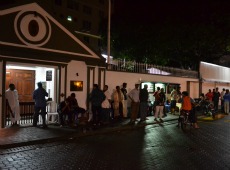This article first appeared on the website of the UK High Commission. Republished with permission.
Like many I was saddened by the execution of the Sri Lankan housemaid Rizana Nafeek in Saudia Arabia last week.
The UK has been actively supporting calls for clemency, not least because there is evidence to suggest that Rizana was a minor at the time of the alleged murder she committed (UK statement on execution).
The UK and fellow EU Member States are strong advocates for abolition of the death penalty (which is no longer permitted in the EU). Last autumn we tried to encourage both Sri Lanka and Maldives to join us in supporting the UN moratorium on the Death Penalty. Despite supporting the previous UN motion in 2010, this time both countries chose to abstain.
Although both Sri Lanka and the Maldives have legislative provision for imposing the death penalty, neither country has carried out judicial executions for some time (since 1976 in Sri Lanka and 1953 in Maldives).
But in both countries there have been recent calls for the reintroduction of the death penalty to help combat some of the more serious crimes. As someone who has worked with very serious offenders in previous jobs, I personally doubt the efficacy of capital punishment as a means of deterring crime and the research I have seen bears this out.
Of course for some people and cultures retribution is an important part of the argument.
It’s natural to feel anger and to desire revenge when we have been wronged. But part of the role of an impartial justice system is to remove emotion from the consideration in order to arrive at an objective assessment of the facts.
This is not to say that the victim’s wishes or feelings should be ignored, but a more dispassionate approach reduces the prospects of a miscarriage of justice. And after an execution, mistakes can, of course, never be rectified.
For others, forgiveness is a stronger impulse.
I was humbled to read the recent comments of Mrs Nimalaraja, a Sri Lankan whose husband was killed by a 14 year old boy in the UK last summer. Following the sentencing of her husband’s assailant last week she said: “I am not angry any more. Before, I was angry because I lost my husband, but I am not angry now. The boy is a child and he didn’t mean to kill Nimal – it was an accident.”
For Mrs Nimalaraja – who attended every court sitting – understanding what had happened and seeing justice done was more important than heaping heavy punishment on the perpetrator.
Robbie Bulloch is the UK Deputy High Commissioner to Sri Lanka and the Maldives
All comment pieces are the sole view of the author and do not reflect the editorial policy of Minivan News. If you would like to write an opinion piece, please send proposals to [email protected]
